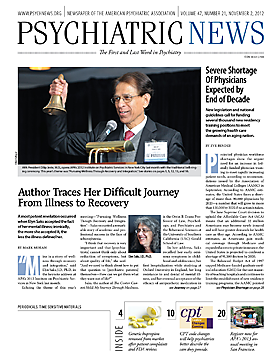Cognitive-behavioral therapy (CBT) is known to be an effective treatment for panic disorder. However, the neural processes underlying its effectiveness have been unclear. So Tilo Kircher, M.D., Ph.D., a professor of psychiatry at Phillips-University Marburg in Germany, and colleagues conducted a study to shed light on the issue.
They used functional magnetic resonance imaging (fMRI) to compare the brain activity of 42 subjects with panic disorder plus agoraphobia both before and after the subjects had experienced 12 sessions of CBT. Also, the post-CBT fMRI results were compared with fMRI results from 42 healthy control subjects.
The findings, which were published online August 27 in Biological Psychiatry, suggest that CBT counters panic disorder by reducing the activity of the inferior frontal gyrus and of the brain’s fear network—the amygdala, insula, basal ganglia, and anterior cingulate cortex.
So how might a CBT–induced reduction in inferior frontal gyrus activity actually reduce panic symptoms? As the scientists explained in their report, the “inferior frontal gyrus is involved primarily in cognitive functions (e.g., attention, execution control, reasoning, verbalization). Especially for panic disorder and its treatment, cognitive processes are highly relevant, because even conditioning processes and exposure therapy have been assumed to involve strong cognitive components. Thus our data indicate that cognitive processes (inferior frontal gyrus) are tightly associated with the aberrant emotional responses (fear network) and the patho-physiology and treatment of panic disorder.” Thus, the results “suggest that CBT reduces negative cognitions, such as increased harm expectancy or attention to threat.”
And how might a CBT-induced lower level of activity of the fear network reduce panic symptoms? “One might speculate that the reduction of activity in the amygdala and insula reflects attenuated negative emotional responses,” the scientists wrote.
These findings might lead to more targeted treatments for panic disorder, the scientists suggested. Or as Kircher told Psychiatric News, “If we look at other, yet-unpublished findings, we [find] differences in brain activation according to genotype, type of CBT, and experimental avoidance behavior. If we take all these findings together, we can distinguish between [patients with] different neurobiological types of panic disorder who might benefit from different types of therapy. But whether this holds true needs further study.”
The study was funded by the German Federal Ministry of Education and Research.

